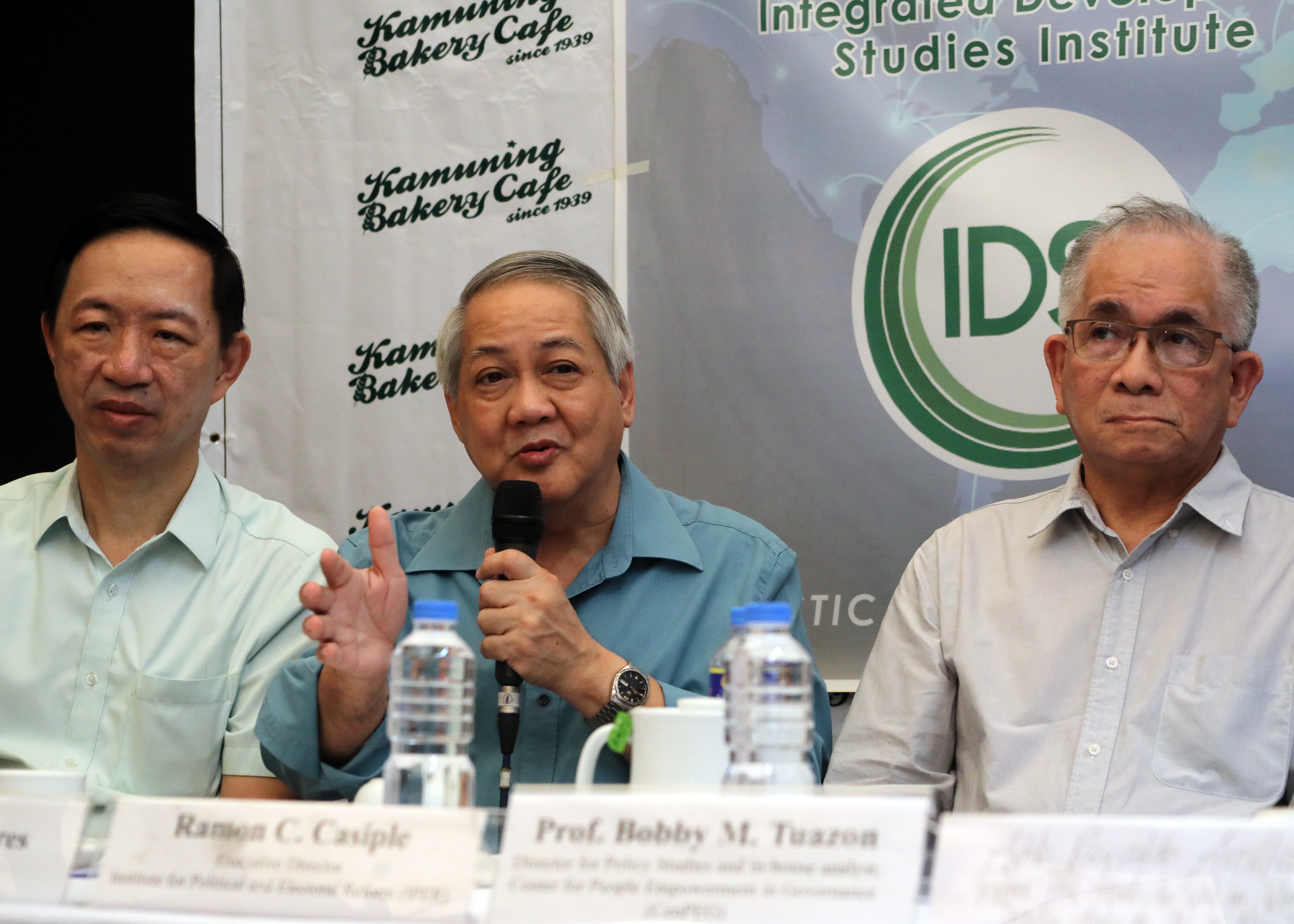News
PH can boost military capabilities sans VFA: experts

VFA TERMINATION. Ramon Casiple (middle), Executive Director of Institute for Political and Electoral Reform (IPER), agrees on the stand of Defense Secretary Delfin Lorenzana and Armed Forces of the Philippines Chief of Staff, Gen. Felimon Santos Jr. on the termination of the Visiting Forces Agreement (VFA), during the Pandesal Forum at Kamuning Bakery Cafe in Quezon City on Monday (February 17, 2020). Also in photo are forum moderator Wilson Lee Flores (left), and UP Professor Bobby Tuazon (right), Director for Policy Studies and in-house policy analyst of the Center for People Empowerment in Governance (CenPEG). (PNA photo by Joey O. Razon)
MANILA — The Philippines can be self-reliant when it comes to enhancing its military’s defense capabilities, experts said on Monday, following President Rodrigo Duterte’s move to abrogate Manila’s 22-year-old Visiting Forces Agreement (VFA) with Washington DC.
In a media forum held in Quezon City, political analyst Ramon Casiple said the Philippines can give support to Filipino troops and combat terrorism even without the VFA.
The Philippines, hence, does not need the scrapped military deal, Casiple said.
“Kailangan ba natin ‘yun para makatayo? Ang sagot ko diyan: hindi (Do we need that for us to rise? My answer is no),” he said. “We can do all that without the VFA.”
The Philippine government, through the Department of Foreign Affairs, sent the formal notice of termination of the VFA to the US government on February 11.
The agreement will be abrogated 180 days after the US receives the formal termination notice from the Philippines.
Casiple said the VFA merely gives Washington DC the “pleasure” than Manila.
He also echoed Philippine officials’ stance that the military pact was more advantageous to American forces than Filipino troops.
“Ako ang tingin ko (The way I see it), we don’t need VFA as a necessity in terms of even our national security. In fact, it’s an argument kung bakit humina ‘yung military natin (why our military weakened). Kasi naging usapin dito ‘yung palaging sinasabi ng mga pro-VFA na (Because those who are pro-VFA are always saying), ‘You need the US,’” Casiple said.
The VFA, signed in February 1998 by the two nations, allows visiting US soldiers to arrive in the Philippines without visa and passport restrictions. It also gives them the privilege to use their permits and licenses in the host country.
Former ambassador to the United States Reynaldo Arcilla, who was also a guest speaker at the media forum, viewed the VFA as a useless military deal.
Citing the admission of an unnamed retired military general, Arcilla said the training provided under the VFA is “not actually training in the sense of military welfare.”
“We don’t need that,” he said.
More advantageous to PH
A day after Manila sent the formal termination notice to Washington DC, US President Donald Trump said on February 11 that it was fine that Duterte scrapped the VFA because the US would be able to “save a lot of money.”
Duterte was elated that Trump understood and respected his decision to revoke the VFA, Presidential Spokesperson Salvador Panelo said on February 15.
George Siy, head of the Integrated Development Studies Institute, said the Philippines would benefit from the abrogation of the VFA because it can now pursue its independent foreign policy.
“Mas may leverage tayo kapag tayo ay independent (We have more leverage when we act as an independent state). I’m not saying we should break ties (with the US).
Our policy should be for an independent foreign policy,” Siy said at the forum.
Casiple said the Philippines can boost its military capabilities without relying on other countries, like its long-time ally, the US.
“An independent country kagaya natin, lalo na may independent foreign policy, ang usual logic is that kung gusto mo ng pro-military, you would enhance it, hindi ‘yung mag-depend ka on other countries (An independent country like us, especially since we have an independent foreign policy, the usual logic is you would enhance your defense capabilities and not depend on other countries if you’re pro-military),” he said.
Be ready for consequences
Meanwhile, the University of the Philippines professor Bobby Tuazon warned the government of possible grave repercussions of Duterte’s move to scrap the VFA.
Tuazon said the current administration should be ready to face “bigger” challenges, such as the military and economic sanctions that might be imposed by the US against the Philippines.
He also cautioned that Washington might implement possible visa restrictions for Filipinos and might take “retaliatory actions” against Filipinos residing and working in the US.
“The Duterte administration should be prepared for this. It will invite some strong diplomatic reactions or sanctions from the US,” Tuazon said.





















